How Has the Meaning of LOL Changed?
It also looks at whether "Laugh Out Loud" is the grammatically correct definition (e.g., would "aloud" or "loudly" be better?).

LOL Shouldn't Always Be Taken Literally
One of the major issues with text messaging is the absence of tone. As a consequence, it is easy for text messages to be misinterpreted. To overcome this, people have learned to illustrate their intended meaning by including tone indicators, icons, and abbreviations, such as LOL (Laugh Out Loud).LOL is now one of the most widely recognized abbreviations in the world. Originally it meant "What you just said made me laugh out loud." However, nowadays it should almost never be taken literally. LOL is sometimes used just to show approval, to acknowledge that something is witty, or even because the sender isn't interested enough to send a more considered response. Even worse, LOL is often used sarcastically!
Sadly for LOL, it is now also one of the least loved abbreviations in the world. Many young people avoid it altogether. Consequently, terms like ALOL (actually laughing out loud) and LLOL (literally laughing out loud) have emerged.
LOL Is an Acronym and an Abbreviation
LOL is both an acronym and an initialism. It can be pronounced like a word (i.e., as "lol") or using its individual letters (i.e., as "El Oh El"). In fact, "lol" is now so well established as a word, that it can be considered a neologism (i.e., a newly coined word or term which has emerged into everyday use).Out Loud Is an Adverb Meaning Aloud
The expansion of LOL is not laugh out loudly. Using loudly would be a grammatical error because out loud is an adverb in its own right. (It means loudly enough to be heard.)Out loud is very similar in meaning to the adverb aloud, which also means loudly enough to be heard but with the added connotation of more than whispering. Both out loud and aloud are quite different from loudly, which means strongly audible or even noisily.
Perhaps Laugh Should be Laughing
While lots of grammarians challenge the out loud part of LOL, the word laugh – from a grammatical perspective – ought to be the one under scrutiny.The present participle laughing would seem a much better fit. This is based on the assumption that the whole phrase is [I am] laughing out loud. Of course, you could argue the whole phrase is something like [I have just let out a] laugh out loud, but that expansion of LOL does not sound natural.
The Evolution of LOL
This video shows the evolution of the term "LOL" and the various laughing emojis:Complete List of Terms Related to LOL
Actually laughing out loud

Big laugh out loud

Evil laugh out loud
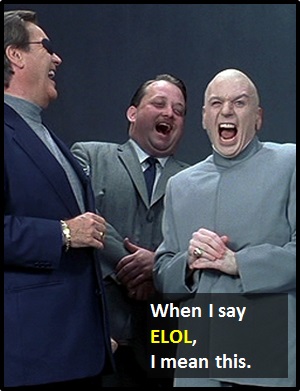
I Just Burst Out Laughing
Literally lol

Laughing out loud (the noun)

Funny picture of a cat
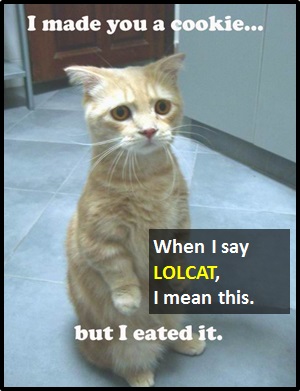
Laughed out loud (i.e. the past tense of LOL)
Laughing out loud (the noun)

Laughing out loud, okay
Laugh out loud literally

LOL, not

Lots of laughing out loud
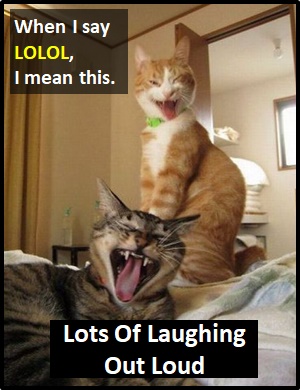
Laugh out loud quietly

Laugh out loud with sarcasm
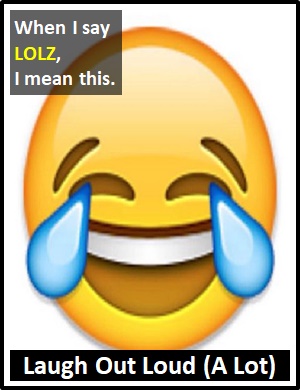
Laughing out loud

not LOL

Rolling on floor, laughing out loud
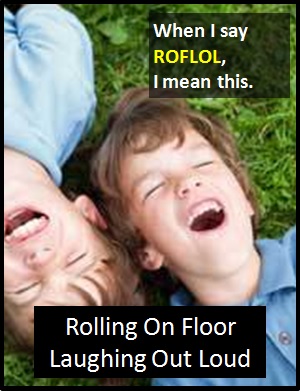
Rolling on the floor laughing out loud

Seriously laughing out loud

Truly laughing out loud

Laughing at somebody who is trolling
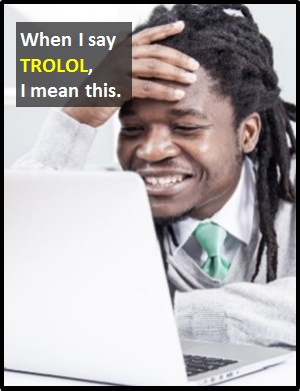
101 (looks like "LOL")
LOL! (101! = 5! = 5 x 4 x 3 x 2 x 1 = 120)

LOL ("101" in binary is 5 (i.e. lol))

Laugh at loud

Laugh at loud
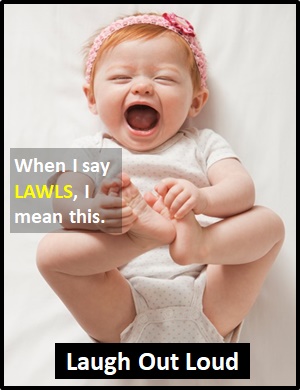
Laugh at loud
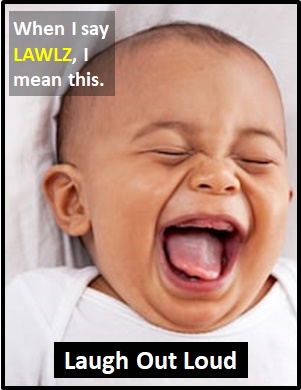
Laugh loudly

Help Us Improve Cyber Definitions
- Do you disagree with something on this page?
- Did you spot a typo?
- Do you know a slang term that we've missed?
You might also like...
Help Us Improve Cyber Definitions
- Do you disagree with something on this page?
- Did you spot a typo?
- Do you know a slang term that we've missed?
Share This Page

If you like Cyber Definitions (or this page in particular), please link to it or share it with others. If you do, please tell us. It helps us a lot!
Create a QR Code

Use our handy widget to create a QR code for this page...or any page.
next up:
k pop bandsMore Topics...
emoji library
(send a huge emoji)sex & dating terms
(fine-tune your search)spotting drug abuse
(protect loved ones)saying "I love you"
(learn new ways)encrypting messages
(get sneaky!)gaming terms
(chat like a gamer)spotting grooming
(protect loved ones)numbers in texting
(improve brevity)Spanish slang terms
(get "slangy" in Spanish)using special symbols
(find the codes)coronavirus terms
(remember covidiots)
